|
|
|
Sort Order |
|
|
|
Items / Page
|
|
|
|
|
|
|
| Srl | Item |
| 1 |
ID:
122832
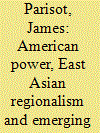

|
|
|
|
|
| Publication |
2013.
|
| Summary/Abstract |
Recent years have seen a revival of discussions on American decline. This paper intervenes in this debate by suggesting that there is a tendency towards partial conceptualisations of US power. It suggests a new historical materialist perspective that makes it possible to theorise American Empire as a relational social totality embedded within global capitalism. The paper then analyses the social limits of China's rise and the integration of East Asian regionalisation into American Empire, suggesting the extent to which world power has shifted east has tended to be overestimated. It also analyses the emergence of Brazil, India, and the brics meetings, suggesting these developments have a limited, but overstated, capacity to challenge American Empire.
|
|
|
|
|
|
|
|
|
|
|
|
|
|
|
|
| 2 |
ID:
113098
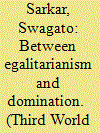

|
|
|
|
|
| Publication |
2012.
|
| Summary/Abstract |
This article presents the problem of governing differences as a problem of constituting a social whole out of the play of antagonistic elements like class, caste, gender, religion, etc, which is essentially a modernist political project in its normative grounding. The problem is explored here vis-à-vis the trajectories of global capitalism and the options for development (that is, the transition from an agrarian economy to an industrial one) for the smaller federal states. The experience of the Left Front Government in West Bengal, India is analysed to understand the issues at stake. The narrative presented in the article shows that questions of land ownership and freedom from oppression and bodily toil remain the fundamental political problem which determines the course and dynamics of governance of differences, particularly its egalitarian mode. This problemat also points towards the limits of agrarian modernity, which many post-colonial countries have tried to constitute.
|
|
|
|
|
|
|
|
|
|
|
|
|
|
|
|
| 3 |
ID:
086572
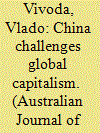

|
|
|
|
|
| Publication |
2009.
|
| Summary/Abstract |
This paper establishes a novel understanding of the nature and implications of China's rise. By borrowing Robert Gilpin's concept of sub-optimisation, it is argued that China is the most prominent player in a non-Western subgroup's suboptimisation strategy, which undermines the Western-dominated neoliberal capitalist system, or the Washington Consensus, and liberal democratic values, taken as gospel by Western economists, governments and industry for the past 30 years. While China and other non-Western states are a part of this system, a consequence of their actions within the system, and particularly in the international energy markets, is that they are increasing their relative gains at the expense of the larger group. China-led subgroup's suboptimisation strategy may result in direct competition between the predominant neoliberal Western paradigm, which is synonymous with globalisation, and which has entered into a structural crisis, and the emerging non-Western economic and political capitalist model.
|
|
|
|
|
|
|
|
|
|
|
|
|
|
|
|
| 4 |
ID:
098080
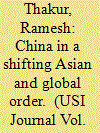

|
|
|
| 5 |
ID:
173436
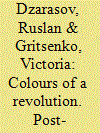

|
|
|
|
|
| Summary/Abstract |
The Ukraine crisis is usually treated either as Russia’s return to the old-style empire-building (the right) or as a clash of two imperialisms (the left). However, the essence of this crisis can be understood only from the dual perspective of the consequences of the Stalinist degeneration of the Russian Revolution and the fate of the modern global capitalism. The most rotten sections of the Soviet bureaucracy moved the society to capitalism. However, this effort could secure only a peripheral (Ukraine) or at best semi-peripheral (Russia) position in the capitalist world-system as a provider of cheap raw materials. Meanwhile, modern capitalism led to world economic crisis. In these conditions, the capital of the core capitalist countries obviously decided to strengthen its control over the periphery, and Russia’s aspirations to secure its domination over the former Soviet space were in the way. To thwart them, Western powers decided to provoke a Ukraine crisis, exploiting Ukrainians’ justified indignation at the backwardness and corruption inherent in their own peripheral capitalism. Hence, a study of the properties of the post-Soviet societies and their place in the world hierarchy is the key to understanding the Ukraine crisis.
|
|
|
|
|
|
|
|
|
|
|
|
|
|
|
|
| 6 |
ID:
124453
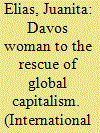

|
|
|
|
|
| Publication |
2013.
|
| Summary/Abstract |
The World Economic Forum (WEF) is a global governance actor that has in recent years taken an increased interest in issues pertaining to gender equality and women's empowerment. The paper critically investigates the work of the WEF in this area, suggesting that WEF-produced gender and development discourse is profoundly compatible with the politics and practices of neoliberalism-not least in the way in which it aligns gender equality and women's empowerment with national economic competitiveness. This is, furthermore, a distinctly postfeminist reading of gender that rests upon the production of neoliberal-compatible female subjectivities-such as "rational economic woman" or "Davos woman"-who emerge as those in society best able to deliver fair and sustainable economic growth (effectively rescuing global capitalism from the excesses of hypermasculine crisis capitalism). The framing of the case for gender equality and women's empowerment in these terms is powerful and may well be an effective way for gender advocates to present their demands. But by analyzing not only how the WEF has framed/represented gender issues but also what has been left out of this representation, the paper points to the way in which simplistic representations concerning the contribution that women make to economic competitiveness disguise the double burdens and gendered structures of socioeconomic inequality that are central to the widening and deepening of the market into all spheres of social life under conditions of roll-back neoliberalism.
|
|
|
|
|
|
|
|
|
|
|
|
|
|
|
|
| 7 |
ID:
046266
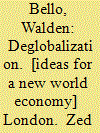

|
|
|
|
|
| Publication |
London, Zed Books, 2002.
|
| Description |
xi, 132p.
|
| Standard Number |
1842773054
|
|
|
|
|
|
|
|
|
|
|
|
Copies: C:1/I:0,R:0,Q:0
Circulation
| Accession# | Call# | Current Location | Status | Policy | Location |
| 046247 | 337/BEL 046247 | Main | On Shelf | General | |
|
|
|
|
| 8 |
ID:
123510
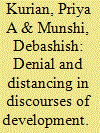

|
|
|
|
|
| Publication |
2012.
|
| Summary/Abstract |
Anxieties about development in New Zealand show up in a deep-rooted fear of the 'Third World' in the country. We examine how the term 'Third World' is deployed in media discourses in economic, social and environmental contexts and how this deployment results in a 'discursive distancing' from anything associated with the 'Third World'. Such distancing demonstrates a fragile national identity that struggles with the contradictions between the nation's desire to be part of the 'First World' of global capitalism and the growing disparities in health and wealth within it. The shadow of the 'Third World' prevents New Zealand from confronting the realities of its own inequities, which in turn comes in the way of a sound development agenda.
|
|
|
|
|
|
|
|
|
|
|
|
|
|
|
|
| 9 |
ID:
085179
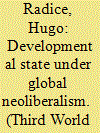

|
|
|
|
|
| Publication |
2008.
|
| Summary/Abstract |
The developmental state remains one of the chief points of reference, both analytical and political, for those who reject the current neoliberal global order. In this paper the validity of this approach is examined theoretically and historically. After a preliminary description of the developmental state, the paper investigates in turn the four terms contained in the title-neoliberalism, globality, the state and development-from a historical materialist standpoint. It is then argued that any approach that aims to provide an effective roadmap for a progressive alternative to neoliberalism needs to centre its analysis on the Marxian concept of class.
|
|
|
|
|
|
|
|
|
|
|
|
|
|
|
|
| 10 |
ID:
124602
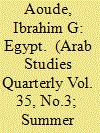

|
|
|
|
|
| Publication |
2013.
|
| Summary/Abstract |
The upheaval that has swept the Arab world, beginning in December 2010, reached Egypt on January 25, 2011. The article argues that capitalist globalization and ultimately the 2008 global financial crisis were main causes of the uprising. The Mubarak regime's privatization schemes exacerbated poverty and widened the already huge gap between rich and poor. Mubarak employed repression to ensure that no effective political opposition would materialize to challenge his authoritarian rule and crony capitalism. Strikes and demonstrations beginning in 2006 and the lead up to the uprising demonstrated that the fight for democracy and economic justice had been intertwined. The ouster of Mubarak has not improved the economic situation for the majority of the population and authoritarian rule remained under the military and since the election of the Islamist President Morsi. Popular resistance continues against the Islamists in power to bring about a secular regime that would establish democracy and economic justice.
|
|
|
|
|
|
|
|
|
|
|
|
|
|
|
|
| 11 |
ID:
073252
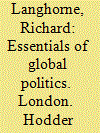

|
|
|
|
|
| Publication |
London, Hodder Education, 2006.
|
| Description |
xii, 372p.Pbk
|
| Standard Number |
0340816910
|
|
|
|
|
|
|
|
|
|
|
|
Copies: C:1/I:0,R:0,Q:0
Circulation
| Accession# | Call# | Current Location | Status | Policy | Location |
| 051532 | 909.83/LAN 051532 | Main | On Shelf | General | |
|
|
|
|
| 12 |
ID:
178133
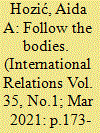

|
|
|
|
|
| Summary/Abstract |
Global Capitalism, Global War, Global Crisis by Andreas Bieler and Adam Morton makes a persuasive case for the enduring relevance of historical materialism as the hermeneutical tool for analysis and understanding of contemporary political economy.
|
|
|
|
|
|
|
|
|
|
|
|
|
|
|
|
| 13 |
ID:
099772
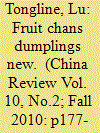

|
|
|
|
|
| Publication |
2010.
|
| Summary/Abstract |
This essay examines fruit Chan's 2004 horror film Dumplings which uses cannibalism as a metaphor for Chinese tradition. In this respect, the film has inherited Lu Xun's criticism of Chinese tradition in his "diary of Madman" at the beginning of the 20th century. This tradition however has been changed radically through the modernization process. Dumplings present contemporary Chinese culture as a hybrid combination, which has been transformed not only by Maoist legacy but also by the powerful influence of global capitalism.
|
|
|
|
|
|
|
|
|
|
|
|
|
|
|
|
| 14 |
ID:
178136
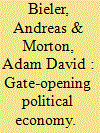

|
|
|
|
|
| Summary/Abstract |
There is a spirit of critique that is dialogical, sincere, and rigorous that defines this forum on Global Capitalism, Global War, Global Crisis from authorities we regard as shaping the recent past, the now present, and the near future of political economy.
|
|
|
|
|
|
|
|
|
|
|
|
|
|
|
|
| 15 |
ID:
067173
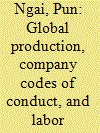

|
|
|
| 16 |
ID:
165597
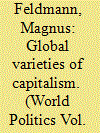

|
|
|
|
|
| Summary/Abstract |
This article analyzes the prospects for globalizing the varieties of capitalism (voc) debate. It identifies and compares firm-centered, governance-centered, and state-centered approaches to extending the debate on capitalist diversity, and discusses the distinctive contributions of each approach as well as the trade-offs between them. The author draws on three agenda-setting volumes that engage with the voc framework and study capitalist diversity in three regions not usually covered by this literature: Latin America, East and Southeast Asia, and East Central Europe. As these regions play an increasingly important role in the world economy, this article examines what the books imply about the current state of knowledge about global voc. The author argues that the extension of the voc debate to these parts of the world is important for advancing the understanding of economic institutions; the approach can reinvigorate research on capitalist diversity and the institutional foundations of economic development in the current era of globalization.
|
|
|
|
|
|
|
|
|
|
|
|
|
|
|
|
| 17 |
ID:
173047
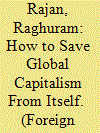

|
|
|
| 18 |
ID:
113093
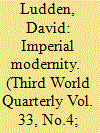

|
|
|
|
|
| Publication |
2012.
|
| Summary/Abstract |
In the recently generalised historical coincidence of neoliberal free-market policy trends with accelerating global economic growth and inequality, India and China stand out as world regions with distinctive histories of imperial inequity. The rise of Asia shows that globalisation does not work the same way everywhere. In Asia historical dynamics of imperial territorialism generate inequities that fit global patterns through their absorption and mediation of capitalism. Economic reforms that brought Asia into global leadership ranks express imperial forms of power, authority, and inequity whose long histories need to be understood to make sense of Asia and global capitalism today. This article focuses particularly on India.
|
|
|
|
|
|
|
|
|
|
|
|
|
|
|
|
| 19 |
ID:
178129
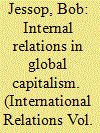

|
|
|
|
|
| Summary/Abstract |
Global Capitalism, Global War, Global Crisis seeks to overcome ontological and epistemological challenges to studying various aspects of the emerging global order in their interconnection.1 Its authors’ theoretical approach develops the philosophy of internal relations to understand the interaction of economic, political, military and social institutions, practices, and conflicts from the viewpoint of a comprehensive analysis of the uneven and combined development of capital relation on the world stage and its connection to forms of class struggle, broadly interpreted. This stresses the continued importance of the state form as nodal within global capitalism.2 My critique is based on an emerging post-disciplinary approach, cultural political economy, to which the Bieler–Morton approach has strong affinities.
|
|
|
|
|
|
|
|
|
|
|
|
|
|
|
|
| 20 |
ID:
148287
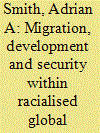

|
|
|
|
|
| Summary/Abstract |
Within international labour migration, received wisdom holds that the migration-development and migration-security couplings co-exist in discord. The migration-development-security relationship is perceived to swing like a pendulum. In this article I reject the simple pendulum formulation which suggests security stands at odds with development. I examine the ways in which migration controls occur through and reproduce racialised global capitalism. Capitalist development and security work together to undermine the resistance struggles of those designated migrant labour. Students of labour migration must refuse the game of balance and instead entrench our analytical efforts within the creative self-activities of ordinary working people.
|
|
|
|
|
|
|
|
|
|
|
|
|
|
|
|
|
|
|
|
|